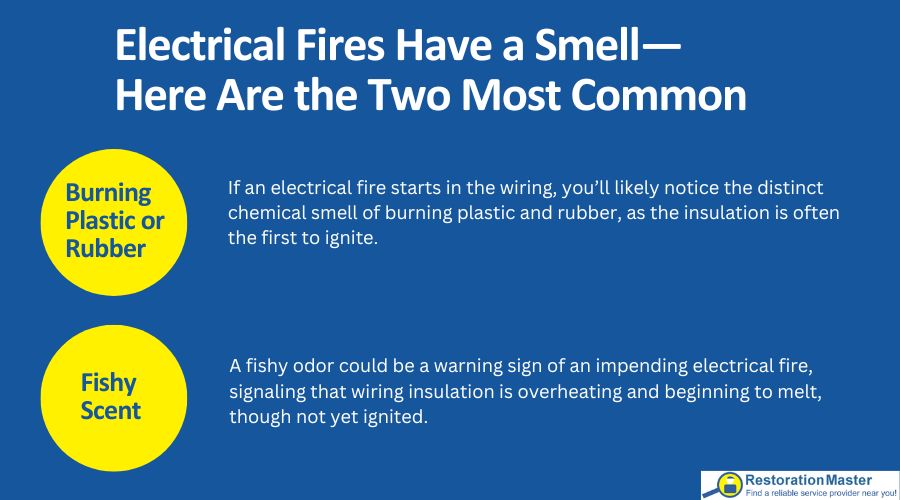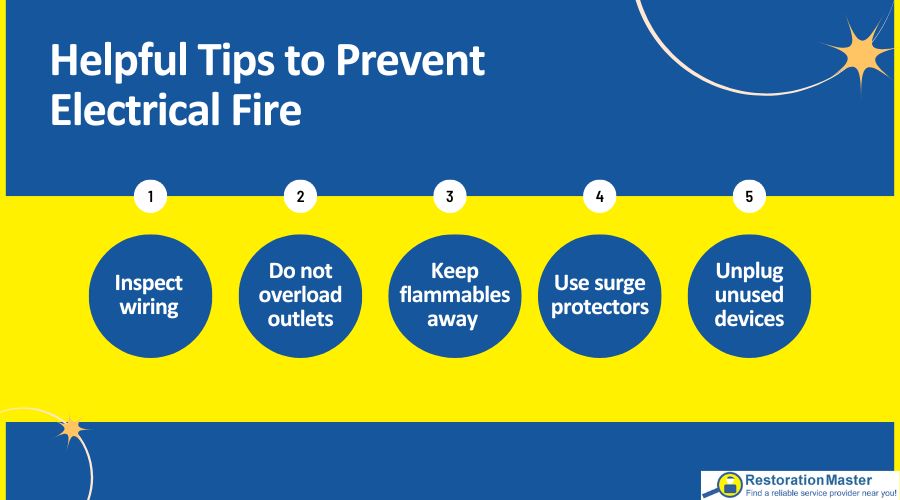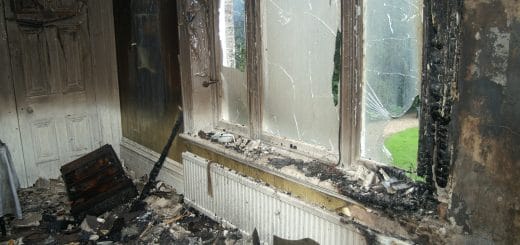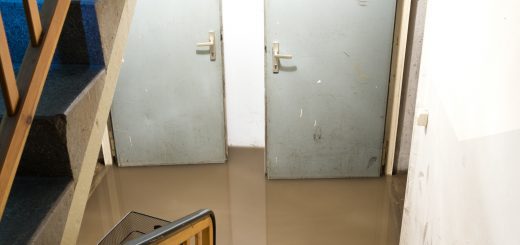7 Warning Signs of an Electrical Fire You Should Never Ignore
The distinct smell of burning plastic or fish could indicate an electrical fire. If you notice an active fire, call 911 immediately. If not, contact an emergency electrician to locate and address the source before further damage occurs.
According to the National Fire Protection Association (NFPA), electrical failures or malfunctions were the second leading cause of U.S. home fires, accounting for approximately 46,700 home structureStructure refers to the framework or components of a buildin... More fires per year, resulting in 390 deaths and over $1.5 billion in property damage annually.
Electrical fires are not always visible at first. They often begin inside walls or electrical panels, but they leave behind unmistakable clues—particularly a sharp, acrid smell, often compared to burning plastic, rubber, or fish. Recognizing these odors can give you a head start in preventing serious fire damage.
In this article, we’ll walk you through:
- The specific smells associated with electrical fires
- Other warning signs to look out for
- Practical preventionPrevention refers to actions taken to reduce the likelihood ... More tips
- How to respond if a fire does occur
How to Identify the Smell of an Electrical Fire?
Electrical fires often occur due to problems with a building’s wiring or faulty electrical appliances. They can also be caused by overloaded circuits, ungrounded outlets, or excessive use of extension cords. Electrical fires tend to happen out of sight, but they do have a distinct smell that can alert you that a fire has started.

Burning Plastic or Rubber
If an electrical fire starts in the wiring, you’ll likely notice the distinct chemical smell of burning plastic and rubber, as the insulationInsulation is a material used in buildings to reduce the tra... More is often the first to ignite. This smell indicates that the fire is intensifying and requires immediate action. Calling 911 is essential, especially if you cannot identify the source of the fire.
If you’ve determined the problematic outlet and can safely unplug the appliance causing the issue, do so cautiously. While it may be possible to extinguish a small fire yourself, it’s always best to involve the fire department to ensure the fire is completely out and no further hazards remain.
If the flames are near the outlet and the wiring is exposed, evacuate the premises and leave the situation to professionals. Additionally, if it’s safe to access your circuit breaker, switch it off to cut power to the affected area.
Fishy Scent
A fishy odorAn odor is a smell, often detectable by the human nose, whic... More could be a warning sign of an impending electrical fire, signaling that wiring insulationInsulation is a material used in buildings to reduce the tra... More is overheating and beginning to melt, though not yet ignited. If you can’t pinpoint the source of the smell, immediately turn off the circuit breakers and contact a professional electrician. They can perform an emergency inspectionInspection is the careful examination and assessment of a pr... More to locate and resolve the wiring issue before it becomes a serious hazard.
What are Some Other Signs of an Electrical Fire?
Strange odors aren’t the only warning signs of a potential electrical fire. If you notice any of the following issues, it’s crucial to call a professional electrician to address the problem before it escalates. Here are some key indicators of an electrical fire risk:

- Circuit breaker tripping: Circuit breakers may occasionally trip when multiple appliances are running on the same circuit, but if it happens frequently, it could signal a deeper electrical issue. Circuit breakers are designed to shut off power when a circuit becomes overloaded to prevent potential fires. However, if tripping becomes a regular occurrence, it often indicates a wiring problem or an overloaded circuit that requires professional attention. A qualified electrician can identify the appliance causing the issue and determine whether the electrical wiring for that specific circuit—or potentially the entire building—needs to be updated or replaced.
- Lights flickering or buzzing sound: Flickering lights can be a warning sign of faulty wiring. If you notice lights flickering or hear a faint buzzing sound when certain lights are switched on, it often indicates an overloaded circuit. This issue could stem from faulty wiring within the circuit or a problem with the light fixture itself. In either case, it’s essential to have a licensed electrician inspect and address the problem promptly to ensure your safety.
- Charred outlets: Charred outlets are a serious warning sign. They indicate either a past electrical fire or an outlet overheating—both of which put your home at risk of a future fire. It’s essential to have a licensed electrician inspect the wiring to determine if repairs or replacements are needed to ensure safety.
- Wiring that is faulty: Improperly installed wiring significantly increases the risk of electrical fires. Common causes include exposed wires, ungrounded plugs, incorrect wiring types, or deteriorating insulationInsulation is a material used in buildings to reduce the tra... More. Any of these issues can leadLead is a heavy metal that can be toxic to humans, especiall... More to dangerous situations if not addressed promptly.
- Sparks that are noticeable: Occasional sparks when plugging something in are generally normal. However, if you notice larger sparks accompanied by a burning smell, residueResidue is any leftover material, such as soot, dust, or che... More, or unusual noises, it’s important to contact an electrician. These signs could indicate a problem with your outlet that needs immediate attention to ensure it’s safe to use.
How to Prevent Electrical Fires?
You can take several steps to reduce the risk of electrical fires, whether at home or in a business setting. Here are a few tips:
- Always inspect wiring: Make sure to get an electrical inspectionInspection is the careful examination and assessment of a pr... More every three to five years so you can avoid hazards from bad wiring.
- Do not overload outlets: Make sure all appliances in our home have the proper voltage for the outlet. Never plug an extension cord into another extension cord.
- Keep any flammables away from outlets: All flammables such as cooking oils and even fabric should be kept away from outlets in case of sparks or heat.
- Use surge protectors: Surge protectors shield devices from unexpected power surges from outlets. This helps prevent damage to the device and reduce the risk of electrical fires.
- Unplug devices when not in use: When possible, make sure to unplug devices when not in use so they do not overheat.
How to Respond if a Fire Does Occur
If you suspect an electrical fire, act fast but stay calm (unlike your smoke alarm, which is now screaming for its life):
- Step away and assess. If there’s smoke, sparks, or the unmistakable smell of burning plastic or fish, don’t try to play hero with a glass of water. That could make it worse, especially with live electricity.
- Call 911 immediately. Even if you think it’s “just a small fire.” Fires are excellent at lying about their size until they’re eating your walls.
- Cut the power—only if safe. If you can safely reach your circuit breaker without passing through smoke or flames, shut it off to cut the electricity. But don’t risk it—your eyebrows are not expendable.
- Evacuate the building. Yes, even if you’re in the middle of watching your favorite show. Fire > sitcom. Get everyone out and don’t go back inside.
- Use a fire extinguisher (Class C). If the fire is very small and contained (like in a single appliance), and you’ve cut the power, you may use a Class C fire extinguisher. If you’re unsure—leave it to the pros.
- Let the firefighters do their thing. When the fire department arrives, step aside. Do not offer them your opinion. They’ve got this.
How to Choose the Right Fire Extinguisher for Electrical Fires?
Leave it to the Pros For Fire Damage Cleanup and Restoration
Preventing electrical fires starts with awareness and proactive safety measures. By recognizing the warning signs, such as burning plastic or fishy odors, flickering lights, or frequently tripping circuit breakers, you can take swift action to prevent potential hazards. Regular electrical inspections, proper use of outlets, and following safety best practices can significantly reduce the risk of fire in your home or business. When in doubt, always seek professional assistance to ensure your electrical systems are safe and up to code. Prioritizing electrical safety not only protects your property but also safeguards lives.
If your home or business has been affected by an electrical fire, it is important to call a fire damage restoration professional to handle the damage right away. These professionals can stabilize and repairRepair is the act of fixing or restoring damaged property, m... More the damage caused by an electrical fire as well as clean leftover smoke and sootSoot is fine black particles composed of carbon and other ma... More. No matter the extent of the damage, it is important to start the restorationRestoration is the process of returning a property to its pr... More as soon as possible to prevent additional damage and get your home back to its original state.












